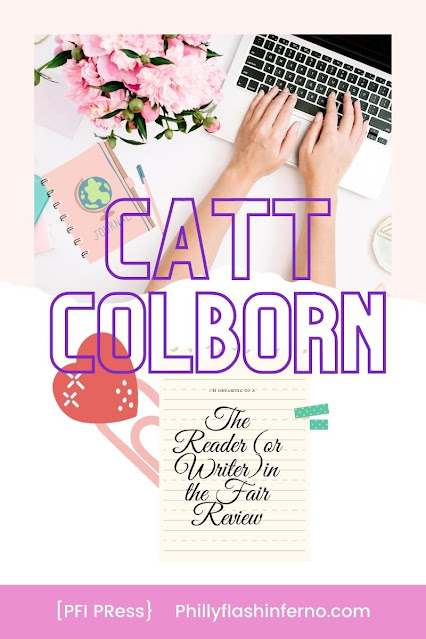The Reader (or Writer) Inside the “Fair” Review?
The Reader (or Writer) Inside the “Fair” Review
Catt Colborn
Thursday, December 30, 2021
You wrote a thing. Someone (maybe your own press) published it. Congrats! Just as you were an author before that happened, no matter what, another author who reads that thing is still your reader. Anyone that reads the work is your reader/reviewer (for now) even though they might not be your future fan.
Hence, this is truly the “fair” review. I know it sucks when they are negative or lecturing, believe me, I’ve been in the trenches for a while. Not kidding. No one deserves word bashing. Not even a person of letters. Still, I press onward because it has been a subject of discourse everywhere I socialize, in the trenches, here especially, but it’s still true. There’s no saying truer for this discourse than “The only way around is through.” Not to be cliché but this is reportage and when I am hot in that hat, a few puns and clichés are the ugly trimmings in that world, which make me sweat my realities out onto the page.
We hear complaints about cancelling things that hurt us, but the truth is I’d rather know my enemy or those who won’t support me in the future, so I can maneuver myself, my family, and my money for promotion safely away from them. I don’t think that all writers who comment on your reviews should be shunned from speaking up about parts that made them drop out (more later on this). As for the basic troll, no one wants to be hurt by words that we feel don’t define us but remember only “you” can define you. It is what I teach my writing students in definition essays. People will always have predispositions of how they think people, places, things, and ideas resonate, but only you can define how those things build the pieces of your true makeup. So, speak to us and define yourself if you’re ready or don’t at all. You don’t have to explain yourself or teach anyone about yourself. And don’t worry! Reviewers’ words aren’t magic. They don’t potion you or your work into what they word-vomited onto a review site. It may affect your life but that is a whole other article that you need to write because I can’t.
Maybe that is too harsh a cliché saying, word-vomited, beings as what we are saying here about everyone having a say in reviews. They said how your work resonated with them. Even if it was angry nonsense, you can’t tell people how they feel. You can tell people how you feel. Annotate it somewhere in your mind and steer clear but don’t let it define you on the review site, and like I said, it can’t. If it’s wiggling into your psyche at night in bed, please do what you need to rectify what those words have done to you, this message is for the lashing out of authors in this current discourse “prepared to decide to respond or not to respond to their writing critics,” or all critics, from everywhere and anywhere in public or online. We all know they are coming for us, let’s be honest. No one is 100% prepared for it, no matter how famous or how long they have shed their critical response skin.
There are reviewers out there that are good honest people. They put where they work out there online and in print and they ask that you respectfully (if opened to reviews) query them before assuming they will review a complete stranger. This is a good course to take, for you too, if they do not like your genre or style and truly are a fair reviewer; they will not want to let their distaste for those review items to impede you or that stack of TBR pile. They have numerous other emails and don’t want to be unfair to you, especially if it’s your debut. You only get one debut, whether that is your own pressed work or a Big Pub House (that is another article to roll around later for me, so put a thumb on that and squash that bug for now). On the other page, some reviewers are human and get tempted to not give someone famous a poor review, ever, humans get enamored that’s our thing. Research your humans to be around, and see if you’re a “human match,” again, this is why the deep research and query-to-review-thingy works so well. Also, there are the trolls and the negative boosters swaying totals of stars. We kind of went over the obvious troll’s MO, so what is the Negative Booster? Negative attention begets attention, so it works. Did you ever see something you have read and been meaning to leave a review, but you refrained from a bad review because you felt bad? Maybe deleted? These Negative Boosters are the people when they see a book taking off because of negative reviews, they add and add to it just because. I will most definitely back away from that if possible and have. This mode of operation can either be like anything else socially on the internet: an awful trend, a bad joke, or yes, a new troll, ugh…reviewing over and over negatively on different accounts. Press is press. Good or bad it’s there for PR. This is why more than ever I will beg again to not pummel yourself over something bad said. Sometimes it becomes not even about the author anymore. Or it blows up because it’s working, crude, or just fanning the burning chaos. The new artform is attention, whatever gets it. I am not asking you to distrust the authors, reviewers, or pub/indie houses you love, but I am asking you to be prepared to be let down as well as impressed when you meet someone you truly admire. These are your readers, the good and the bad.
To go full writerly hook to conclusion here on you, I am an author and teacher and have author friends, who do nothing else in their spare time but read and review as much as the most popular reviewers. Writers are allowed to review and say what they like and don’t like (but hear me out before you get heated), but the reviews from other authors should be “critical within reason.” We, as authors, shouldn’t go on and on of HOW we would’ve wrote every detail of someone else’s book, but whether an MFA or pure genius or passionate newcomer, if you’ve tripped over something in the work several times, because it was disjointed and never corrected (not talking basic typos), or something was left out so you were lost multiple times (not just in a flashback); they are going to comment on it, especially if they paid for the book like anyone else. The good news is they will probably also comment on some great things about the work, mostly proud to be peers. Writing is a beautiful artform because it connects us and makes us want to respond. Hopefully, because a writer that’s also sitting at home and self-taught and unselfish or from a fancy-schmancy program would want that in return.
I know there will be someone that will read and review a friend or I, purposely because I wrote a fair review of the fair review, but that’s exactly what I am saying here. It isn’t fair out there! I have tried and asked and lived and watched. The fair review is both the good and the bad. That’s what happens when you put yourself out there. Some say, you let them win if you don’t, but I say, you can only do what you are prepared to do, especially if it’s triggering. Good news: you are an author regardless of what you choose to do, and you win anyway. They will never take that away. Grip your art tight to your chest and be thankful for the greatest gift you can always give to yourself.

.jpg)

Comments
Post a Comment